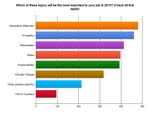
A Time of Job Cuts and Moves
- By L.K. Williams, EPonline
- Feb 26, 2010

Table 1. Click to enlarge.
Nearly 39 percent of Environmental Protection's annual Salary Survey respondents said they changed jobs in 2009 because of job cuts, and a slightly higher percentage, 42 percent, said they left because they were looking for more pay and better benefits [Table 1]. Those numbers translate into quite a lot of activity for about 976 of the 1,212 respondents who participated in the survey in 2009.
Only 531 responded to the question on salary cuts. Seventy percent said they experienced reductions between 0 and 5 percent and 7 percent said they lost more than 20 percent of their salaries.[Table 2]
When EP first published its survey invitation, more than 30 site visitors posted comments about the job situation, complaining about layoffs and more responsibilities for the same pay. A few survey respondents agreed to answer questions after the survey was closed to shed more light on the subject.
According to Environmental Protection's 2008 Salary Survey, only 10 percent of 1,245 respondents changed employers, and they spent three months or less (55 percent) finding a new position. Of those who said the job search was hard (36 percent), most attributed the difficulty to workforce competition or unacceptable pay and benefits (34 percent each).

Table 2. Click to enlarge.
Who's to blame?
An executive vice president from the Detroit, Mich., area had a lot to share: "About 5 percent of the EHS folk I know have already simply abandoned the EHS field entirely and are now gainfully employed in another field, simply to feed their families." He did not blame the economy. He said "the attempted wholesale castration of the environmental requirements (as well as health & safety requirements and any other requirement that routinely has a "long-term" [greater than 1 year long] payout) by the 8 years of the most recent Bush Administration is to blame!"
A senior principal with 25 years experience in the environmental industry disagreed. "Economy is first," he said. "Second is government grants supporting programs [that] take way too long and only disburse annually."
A safety, health and environmental coordinator in Texas who didn't think the job cuts were a widespread problem commented that "It is a common opinion among EHS professionals that we are not indispensable. The recession further undermined a profession that is viewed in industry as a necessary evil. When layoffs were the solution du jour, the most unpalatable or unproductive jobs (in management's opinion) were the first to be axed."
An environmental health and safety manager in Ohio said he had not been affected by job cuts but was considering some additional training to increase his chances of success in the industry. "The problem is finding the time and money to do so. Also, it's hard to know where I should focus my efforts. It's tough to know if I should focus on OSHA regulations or EPA."

Table 3. Click to enlarge.
In a question about what tools would be needed for future success in the job market, training came in as the winner at almost 76 percent. New technologies (49 percent) and knowledge of international regulations (21 percent) followed. Among the open ended comments was the idea that regulatory knowledge and enforcement are very important. One respondent offered a solution to the current politically tinged regulatory environment: "Competent, knowledgeable environmental professionals writing technically justified, regulatory standards instead of lawyers and bureaucrats that have no practical "real world" experience."
Respondents identified a number of topics that will be important to their jobs in 2010 (Table 3). Ranking highest in the "other" category were remediation, stormwater, energy, and hazardous waste. Some of the more interesting responses included:
- "Our political leaders do not recognize that we must have manufacturing to survive. We cannot import all that we consume;"
- "Globally harmonized system;"
- "Lisa Jackson's plan to move from assistance to enforcement;" and
- "New rules aimed at punishing business; not based on science, for example climate change legislation."
Those last two comments demonstrate the level of industry interest in the Obama administration's EPA and its new administrator, Lisa P. Jackson. She had only been in office for about 8 months when EP asked respondents to judge her record. Forty-one percent gave Jackson the benefit of the doubt, responding that it was too early to tell. Nearly 30 percent said they didn't know how to respond. Twelve percent said "she has done a lot of talking but not much action" and 11 percent said "she's going too far." Only 6 percent said she was doing "a good job."
Another Obama initiative, the American Reinvestment and Recovery Act, was met with misgiving. Fifty-four percent of respondents said they did not think the stimulus money was or will be making a difference in the environmental field. Twenty-three percent thought it would and another 23 percent were undecided.
Who Responded
The 1,212 respondents who completed the survey listed their job title as
- environmental health & safety security manager (nearly 20 percent),
- regulatory compliance specialist (13 percent),
- engineer (12 percent).
- consultant (11 percent),
- project manager (11 percent),
- C-level manager (10 percent).
About 16 percent of respondents chose "other" for their job title, and many of these titles were related to environmental protection specialist/manager (37 respondents); EHS/Safety (35 respondents); water and wastewater positions (24 respondents); and government inspector or regulator (10 respondents).
Twenty-nine percent of the respondents said they work in the manufacturing sector. Nearly 24 percent work in consulting, and 20 percent said they work in government. About 11 percent were spread across the "other" category and included mining, energy, transportation, waste services, construction, healthcare, laboratory, education, financial services, and even an ethanol production plant.
Better off than 10 years ago?
In 1999, 295 environmental professionals responded to EP's salary survey. Many of them blamed concomitant layoffs from mergers and acquisitions, a maturing industry, and shrinking government cleanup funding for the poor job outlook. Average salaries ranged from $40,000 for an engineer working in the government sector to $82,333 for a corporate-level manager working for a consulting firm. When compared to average 2009 salaries in the table below, 1999 salaries have increased significantly. But with those increases have come added responsibilities. For example, the 1999 survey used the job title "Environmental Health and Safety," not "Environmental Health Safety and Security."
When all the important aspects are accounted for, do you think environmental professionals today are better compensated than a decade ago?
Environmental Protection conducted its first salary survey in 1994. The 2009 survey is not scientifically valid. It is a compilation of reader responses.
Top Job Title Salary Averages by Sector, Education, Experience
| |
Environmental Health, Safety, & Security |
Regulatory Compliance Specialist |
Engineer |
Consultant |
Project Manager |
C-level Manager |
Scientist |
| Overall Average |
$87,411 |
$76,561 |
$86,562 |
$88,992 |
$84,384 |
$99,303 |
$75,699 |
| Sector |
|
|
|
|
|
|
|
| Manufacturing |
$80,714 |
$71,161 |
$85,226 |
N/A |
<10 responses |
$104,509 |
<10 responses |
| Consulting Firm |
<10 responses |
<10 responses |
$85,929 |
$88,751 |
$82,038 |
$121,632 |
$82,289 |
| Government |
$85,884 |
$64,924 |
$83,593 |
<10 responses |
$76,299 |
$79,577 |
$72,198 |
| |
|
|
|
|
|
|
|
| Education |
|
|
|
|
|
|
|
| Bachelor's |
$78, 547 |
$77,016 |
$84,029 |
$86,216 |
$80,134 |
$105,213 |
$60,231 |
| Master's |
$105,606 |
$77,994 |
$89,372 |
$90,482 |
$89,935 |
$105,658 |
$80,525 |
| |
|
|
|
|
|
|
|
| Experience (yrs.) |
|
|
|
|
|
|
|
| 6-10 |
$72,476 |
$86,535 |
$79,968 |
$61,885 |
$72,500 |
<10 responses |
$60,800 |
| 11-15 |
$84,765 |
$67,000 |
$78,619 |
<10 responses |
$76,588 |
$85,927 |
<10 responses |
| 16-20 |
$88, 878 |
$71,360 |
$86,121 |
$84,266 |
$84,071 |
$86,935 |
$79,314 |
| 21-25 |
$91,477 |
$70, 270 |
$89,248 |
$93,181 |
$88,115 |
$114,384 |
$97,908 |
| |
|
|
|
|
|
|
|
Average and Median Salaries of Job Titles
| Job Title (# of respondents) |
Average Salary |
Median Salary |
| C-level Manager (119) |
$99,303 |
$90,000 |
| Consultant (133) |
$88,992 |
$85,000 |
| Engineer (150) |
$86,562 |
$85,000 |
| Environmental Health, Safety, & Security (238) |
$87,411 |
$81,000 |
| Hazmat Professional (16) |
$72,518 |
$70,000 |
| Industrial Hygienist (19) |
$89,062 |
$84,000 |
| Other (193) |
$82,224 |
$72,000 |
| Project Manager (130) |
$84,384 |
$84,000 |
| Regulatory Compliance Specialist (156) |
$76,561 |
$70,000 |
| Scientist (58) |
$75,699 |
$67,000 |
Average Salary Across Job Sectors
| Job Sector |
Average Salary |
| Oil & Gas |
$117,818 |
| Power Utility |
$94,507 |
| Other |
$92,397 |
| Consulting |
$88,601 |
| Manufacturing |
$83,813 |
| Government |
$74,611 |
| Water & Wastewater Treatment |
$73,296 |
Note: Fewer than 10 respondents classified themselves as working in the recycling, renewable energy, pollution control, and green building job sectors.
About the Author
L.K. Williams is the Environmental Group Editor of 1105 Media.